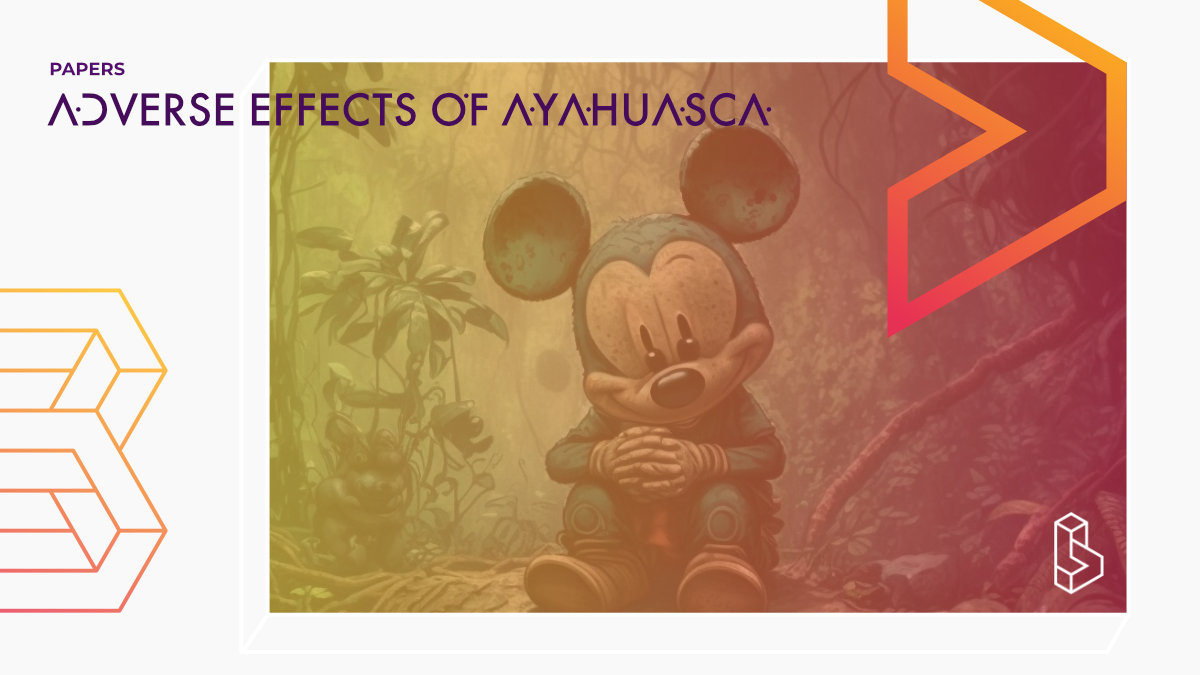This survey study (n=10.800) of those who have used ayahuasca finds high numbers (70%) of acute physical health adverse effects (e.g. vomiting) and the need for medical attention in 2.3%. They also found adverse mental health effects in the weeks and months after the experience (56%), though most (88%) saw these challenges as part of the growth or integration process. A small, but substantial, group (12%) sought professional support for these effects.
Abstract
“Introduction Ayahuasca is a plant-based decoction native to Amazonia, where it has a long history of use in traditional medicine. Contemporary ritual use of ayahuasca has been expanding throughout the world for mental health purposes, and for spiritual and personal growth. Although researchers have been conducting clinical trials and observational studies reporting medical and psychological benefits, most of these do not report ayahuasca’s immediate or medium-term adverse effects, so these are underrepresented in the literature. With the expansion of ayahuasca ceremonies from their traditional contexts to countries around the world, there is an important public health question regarding the risk/benefit balance of its use.
Methods We used data from an online Global Ayahuasca Survey (n = 10,836) collected between 2017 and 2019 involving participants from more than 50 countries. Principal component analysis was performed to assess group effects. Logistic regression analysis was performed to test for adverse effects associated with history of ayahuasca use, clinical, context of use and spiritual effect variables.
Results Acute physical health adverse effects (primarily vomiting) were reported by 69.9% of the sample, with 2.3% reporting the need for subsequent medical attention. Adverse mental health effects in the weeks or months following consumption were reported by 55.9% of the sample, however, around 88% considered such mental health effects as part of a positive process of growth or integration. Around 12% sought professional support for these effects. Physical adverse effects were related to older age at initial use of ayahuasca, having a physical health condition, higher lifetime and last year ayahuasca use, having a previous substance use disorder diagnosis, and taking ayahuasca in a non-supervised context. Mental health adverse effects were positively associated with anxiety disorders; physical health conditions; and the strength of the acute spiritual experience; and negatively associated with consumption in religious settings.
Conclusions While there is a high rate of adverse physical effects and challenging psychological effects from using ayahuasca, they are not generally severe, and most ayahuasca ceremony attendees continue to attend ceremonies, suggesting they perceive the benefits as outweighing any adverse effects. Knowing what variables might predict eventual adverse effects may serve in screening of, or providing additional support for, vulnerable subjects. Improved understanding of the ayahuasca risk/benefit balance can also assist policy makers in decisions regarding potential regulation and public health responses.”
Authors: José C. Bouso, Óscar Andión, Jerome J. Sarris, Milan Scheidegger, Luís F. Tófoli, Emérita S. Opaleye, Violeta Schubert & Daniel Perkins
Summary of Adverse effects of ayahuasca
Ayahuasca is a decoction made from the vine Banisteriopsis caapi, which contains beta-carboline, monoamine oxidase inhibitor (MAOI) compounds harmine, harmaline, and tetrahydroharmine (THH). It is used in traditional Amazonian medical systems to treat medical conditions by inhibiting the breakdown of many phytochemical compounds, including monoamines.
Despite its ambiguous legal status, ayahuasca use has increased internationally in recent decades. However, contemporary use typically resembles traditional use in several aspects and offers some degree of protection against adverse effects.
Find this paper
Adverse effects of ayahuasca: Results from the Global Ayahuasca Survey
https://doi.org/10.1371/journal.pgph.0000438
Open Access | Google Scholar | Backup | 🕊

